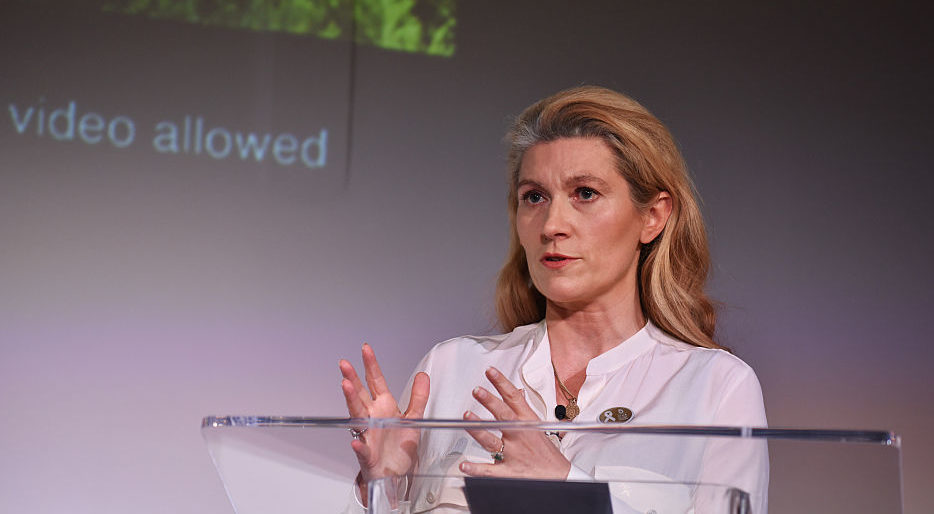
Digital sustainability: it pays to be a leader, not a laggard
Companies that excel in both digital and sustainable transformation attract a stock market premium, according to research. So, how do you tap into that value? ...

by Natalia Olynec Published 10 April 2022 in Sustainability • 8 min read
More and more companies are appointing Chief Sustainability Officers (CSO) to facilitate the transformation of their business and drive efforts to meet sustainability goals. But is it essential to have someone in the C-suite in charge of sustainability? And what impact do CSOs have?
In 2004, DuPont became the first publicly traded US company to appoint an executive with the title of “Chief Sustainability Officer” when it hired Linda Fisher from the US Environmental Protection Agency. By 2020, sustainability-focused executive recruitment firm Weinreb Group identified 95 CSOs at US public companies, up from 29 in 2011, in its report The Chief sustainability Officer: 10 Years Later. The Rise of ESG in the C-Suite.
In the past, such appointments were criticized as window dressing or greenwashing, but now sustainability is a core element of many companies’ business strategy. The recent growth in CSO appointments is the result of a real business imperative, in which sustainability goals and commercial interests are closely aligned.
The expansion is also partly the result of external pressure – from investors, customers, employees, regulators and other stakeholders. There was a particularly strong surge in CSO appointments in 2020 when social justice movements, growing awareness of climate change and the COVID-19 health crisis boosted interest in sustainability. Thirty-one US companies created new CSO positions last year, more than double the number recorded in any previous year, according to the Weinreb Group’s survey.
Pressure from investors and lenders is a major driver of such appointments. Companies are having to answer increasingly probing questions about ESG risks and opportunities, particularly from institutional investors. The most high-profile example is BlackRock CEO Larry Fink’s annual letter, in which he regularly urges companies to pay increased attention to ESG considerations. But this is just the tip of the iceberg.
A 2020 survey of 600 institutional investors in six countries by communications consultancy Edelman showed the vast majority believed that companies which prioritized ESG initiatives offered opportunities for better long-term returns and merited a premium valuation. And while 93% said they were more interested in taking an activist approach to investing, 85% felt that most companies were not prepared to handle an activist campaign. Meanwhile, a study by the University of Oxford found that institutional investors overwhelmingly wanted companies to identify and report ESG factors that affected performance, but that they also want data to be more robust and transparent.

“As more investors see sustainability as a necessary strategy for both survival and differentiation, the CSO is advantageously placed to serve as a company’s CEO and guide its transition toward a new economic reality”Kering CSO Marie-Claire Daveu
Companies have vastly increased the amount of reporting that they do on sustainability in response to this pressure, notably through extensive annual sustainability reports which set goals and measure progress. In 2018, some 86% of S&P 500 companies published a sustainability report compared with just 20% in 2011. And reporting requirements are likely to increase in future, either because they will be imposed by regulators or because of demand from investors.
So do companies need a CSO to coordinate their sustainability efforts? Certainly, having someone in the C-suite in charge of sustainability sends a powerful signal that the company is taking the issue seriously. And having a CSO does appear to have a positive impact on companies’ sustainability performance. Researchers at INSEAD found that firms with a CSO engaged in more socially responsible activities, significantly reduced irresponsible activities and registered a higher Tobin’s Q, a measure of the market’s long-term valuation of companies. However, the evidence is not unequivocal. Patricia Kanashiro, associate professor at the Sellinger School of Business and Management at Loyola University Maryland, found no link between the presence of a CSO and better environmental performance in 2006-2011, and companies with higher pollution emissions often also have CSOs.
The CSO’s remit varies widely between industries and companies, depending on the areas in which they have the greatest social and environmental impact. But in broad terms their role is to interpret changes in the external sustainability environment, work out the strategic consequences for their firm, and then ensure that their firm delivers on its ESG commitments, according to consultancy Deloitte.
This requires a particular combination of skills. An ability to communicate with people internally and externally is perhaps the most important element. Deloitte says the CSO is charged with influencing, communicating and cutting through the organizational complexity to allow their firm to meet its sustainability targets. They therefore need to be adept at building relationships and breaking down barriers.
But they also need to have a deep understanding of the firm’s operations to be able to identify levers for delivering improvements in its sustainability performance. Over the past decade the role has transformed from focusing mostly on compliance and communications to one embedded much more in business development, requiring a complex new set of skills, explains Simon Boas Hoffmeyer, Senior Director Sustainability at Danish brewer Carlsberg Group.
The ability to identify and communicate future scenarios related to environmental, social and regulatory issues often leads to innovation of new products, services, and operational efficiencies. Deep understanding of the business is the key to influencing strategic decisions. “You can’t be seen as an internal NGO. You need to be equal parts business development, salesperson, project manager and subject matter expert,” he explains. “Sustainability is now deeply embedded in everything we do.”
Weinreb founder Ellen Weinreb identifies an ability to “translate the complex” as one of five key attributes for a successful CSO (see box).
What makes a successful CSO?
Cultivating collaboration and buy-in throughout the corporation is less about exercising top-down authority and more about influencing through inspiration, demonstrable outcomes, and competitive analysis.
The issues dominating the CSO agenda are complex, interconnected and volatile. CSOs effectively cope with ambiguity by knowing when and how to shift gears, motivating others during times of uncertainty, working without complete direction, and imagining what’s possible in an uncertain and ever-changing future.
Sustainability issues are big and complex and sustainability leaders need to help their companies — and even individual business units — contextualize why the issues matter and how to address them.
There’s a reason leading companies pair sustainability with innovation. Both functions require a certain stomach for risk-taking. CSOs are often charged with creating new goals for complex problems. They must be willing to experiment, learn and iterate.
CSOs are not in this role for an ego boost. Rather, they are the consummate collaborators — the people who are most likely to champion others, praise generously, and inspire others to support a vision for the future that benefits all.
Position in the corporate hierarchy is also important in ensuring that the CSO has the clout to drive forward actions that may initially meet with defensive reactions in some parts of the business. Weinreb Group found that only 21% of CSOs reported directly to the CEO in 2020, with 55% reporting to someone else who reports to the CEO and the remaining 24% even further down the pecking order. In contrast, 35% of CSOs were reporting directly to the CEO in 2011. However, a survey carried out by environmental research group GreenBiz detected an increase in the number of large companies where the sustainability leader reports directly into the CEO, from 19% in 2018 to 26% in 2020.
But even if many CSOs do not have a direct reporting line to the CEO, half of those surveyed by Weinreb Group found the CEO was their biggest champion and more than 70% said they meet their CEO at least once a month. GreenBiz also found a marked increase in CEOs’ interest in sustainability. It asked survey respondents to rate how involved their CEO is in the organization’s sustainability program, on a scale from one (openly dismissive) to seven (owns it, very engaged). In 2020, 43% rated their CEO’s engagement at either a six or a seven, an eight-percentage point increase from 2018. This is hardly surprising when the CEO’s own fate may be decided by the company’s success in meeting its sustainability goals.
The CSO’s in-depth knowledge of a company’s business and the growing importance of sustainability for firms could even make them good candidates to eventually become CEOs themselves. As Kering CSO Marie-Claire Daveu notes: “Traditionally, being the CFO or Chief of Strategy was seen as a gateway to being a CEO, but as more investors see sustainability as a necessary strategy for both survival and differentiation, the CSO is advantageously placed to serve as a company’s CEO and guide its transition toward a new economic reality, where competitiveness and sustainability are inseparable.”
Case in point, before becoming CEO of Swedish fashion giant H&M in 2020, Helena Helmersson worked as H&M’s sustainability chief for four years prior to being the head of global production and then chief operating officer. She took the helm as the garment industry faces increased demands for ESG transparency, circular economy solutions, and sustainable supply chains.
At the same time, as sustainability becomes embedded in all senior roles, in the long run it is possible that the CSO position will itself become obsolete, or “biodegradable” as Xylem CSO Claudia Toussaint describes it. Weinreb found that while many companies have been appointing their first CSOs in recent years, several others have eliminated the CSO position, possibly because they saw the role as that of a builder responsible for initiating sustainability programs that would subsequently be maintained by all senior executives.

Chief Sustainability Officer at IMD
Natalia is the Chief Sustainability Officer at IMD. She designs and implements sustainability strategy, develops executive education programs and advisory, publishes research, builds cross-sector partnerships, and communicates IMD’s ambitions and progress. The Center for Sustainable and Inclusive Business, co-led by Olynec, aims to support leaders and companies to take steps towards a more sustainable and inclusive business world by harnessing IMD’s knowledge and expertise in the area and offering tools to help them deliver systemic, innovative, and impactful responses.

17 July 2024 • by Michael R. Wade, Evangelos Syrigos in Sustainability
Companies that excel in both digital and sustainable transformation attract a stock market premium, according to research. So, how do you tap into that value? ...

11 July 2024 • by Stéphane J. G. Girod in Sustainability
A series of watershed events forced CHANEL out of its comfort zone, culminating in the launch of CHANEL Mission 1.5°. With this new strategy, the luxury fashion house embarked on a journey...

5 July 2024 • by Avni Shah in Sustainability
Creative industries have a key role to play in creating positive social change. Here are six key insights to help them achieve their goals. ...

3 July 2024 • by Richard Baldwin, Salvatore Cantale in Sustainability
The EU Corporate Sustainability Reporting Directive (CSRD) will impose comprehensive and standardized sustainability reporting responsibilities on firms, adding unprecedented complexity to mergers and acquisitions. ...
Explore first person business intelligence from top minds curated for a global executive audience